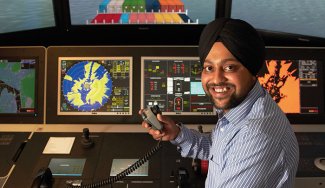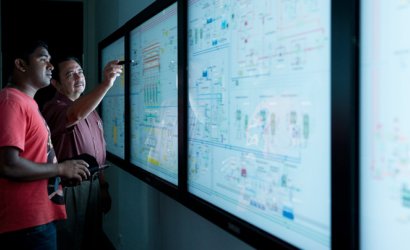

Why choose this course?
For a career as a Master in the maritime industry this qualification provide you with the skills and knowledge you need to meet the academic requirements for certification as a Master Unlimited as described in Marine Orders 71 (Masters and Deck Officers) 2014(opens in a new tab) – Seagoing Qualifications (Version six) under the Navigation Act 2012.(opens in a new tab)
This qualification provides you with the practical skills and knowledge appropriate to the management of a vessel in the area of marine safety, bridge and cargo operations, stability, marine law, ship management, construction and maintenance. You will also learn vessel handling skills, navigational safety and command operations as well as management skills required for this industry.
Students who wish to enter this course must meet the following AMSA requirements:
- have completed at least 12 months documented qualifying seagoing service in charge of a navigation watch on vessels greater than 500 gross tonnage (>500 GT), while holding a certificate of competency as a Watchkeeper Deck and on vessels on voyages of at least 24 hours duration.
Based on any certificates or qualifications that you may already hold, you may be required to undertake additional short course qualifications as specified by AMSA. This is an AMSA requirement for certification for all seafarers. This course is currently cited as meeting some of the requirements for certification as a Master Unlimited as described in Marine Orders 70 and 71(2014)(opens in a new tab) under the Navigation Act 2012 (opens in a new tab)by the Australian Maritime Safety Authority (AMSA).
Please note the Maritime calendar differs from the standard TAFE WA semester calendar. Semester dates are stated in your Letter of Offer.
This course is a full-time program that is timetabled over 4 to 5 days per week. This means you will have a very heavy study load which will encroach on your personal commitments during weekdays over the course of the program. The timetabled hours per week are essential to ensure all course requirements are met.
Please note that some units of competency will be delivered and assessed by South Metropolitan TAFE lecturers at an external location with the required specialised equipment.
Career opportunities
- Ship's Master
-
An IELTS score (academic) of 7.0 with no band score less than 7.0 or equivalent.
-
Completion of MAR50320 Diploma of Maritime Operations [Watchkeeper Deck] (AC52) OR MAR50320 Diploma of Maritime Operations [Master less than 500 GT] (AC53) is required for entry into this course.
-
Equivalent to Australian Year 12.
-
Students must submit a comprehensive Resume outlining their work experiences, employment history and qualifications in order for the application to be assessed for entry into this course.
-
You must have the following to be considered:
have completed at least 12 months documented qualifying seagoing service in charge of a navigation watch on vessels ≥500 GT: while holding a Certificate of Competency as Watchkeeper Deck; and on vessels on voyages of at least 24 hours duration.Based on any certificates or qualifications that you may already hold, you may be required to undertake additional short course qualifications as specified by AMSA. This is an AMSA requirement for certification for all seafarers. This course is currently cited as meeting some of the requirements for certification as a Master Unlimited as described in Marine Orders 70 and 71(2014) under the Navigation Act 2012 by the Australian Maritime Safety Authority (AMSA).
You will need a certificate of competency to be qualified to work in the Australian maritime industry and on Australian or international vessels in international waters. You must also be properly trained to work in your role in the maritime industry. (See Qualifications & training (amsa.gov.au) for more information).
Based on any certificates or qualifications that you may already hold, you may be required to undertake additional short course qualifications as specified by AMSA. This is an AMSA requirement for certification for all seafarers. The fees may be up AUD $10,000 depending on your training.
There may be further semester intakes available for enrolment. You can view any further intakes when you submit your online application(opens in a new tab).
For information about pathways from TAFE to university, view our Pathways to university page.
How to apply
Apply to study at TAFE in six steps:
- find a course;
- check entry requirements;
- submit an application;
- accept your offer and pay;
- apply for your student visa; and
- receive your visa and come to Australia for your studies.
Build your own course guide
Select the study areas, courses and topics you like. Get your custom guide by email!
Download study area guide(opens in a new tab)
Contact us(opens in a new tab)
TAFE International Western Australia (TIWA) is the Registered Training Organisation (RTO) and Commonwealth Register of Institutions and Courses for Overseas Students (CRICOS) provider, for the delivery of training to international students, enrolled in a TAFE course in Western Australia. This nationally recognised course is delivered by a Western Australian TAFE college on TIWA's behalf. TIWA retains responsibility for the quality of the training and assessment delivered by the TAFE colleges and for the issue of certification documentation to students.

